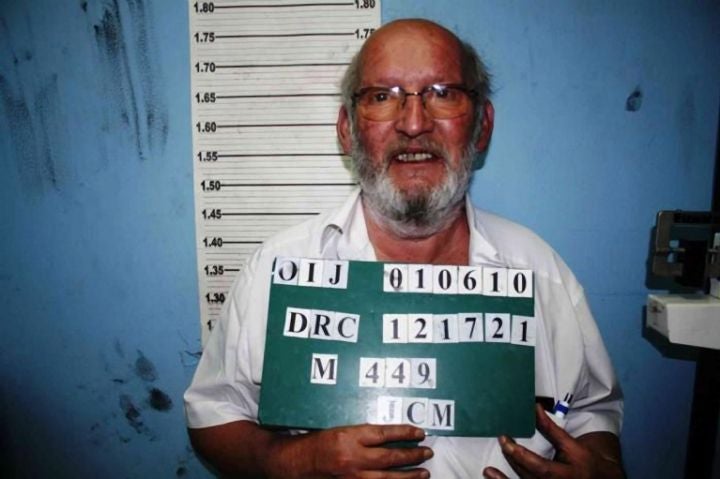
Your support helps us to tell the story
From reproductive rights to climate change to Big Tech, The Independent is on the ground when the story is developing. Whether it's investigating the financials of Elon Musk's pro-Trump PAC or producing our latest documentary, 'The A Word', which shines a light on the American women fighting for reproductive rights, we know how important it is to parse out the facts from the messaging.
At such a critical moment in US history, we need reporters on the ground. Your donation allows us to keep sending journalists to speak to both sides of the story.
The Independent is trusted by Americans across the entire political spectrum. And unlike many other quality news outlets, we choose not to lock Americans out of our reporting and analysis with paywalls. We believe quality journalism should be available to everyone, paid for by those who can afford it.
Your support makes all the difference.Interpol is seeking the arrest of the boss of a French company whose breast implants are at the centre of an international health scare.
Jean-Claude Mas, 72, is wanted by Costa Rican authorities for crimes involving "life and health", according to the international police agency's website.
Interpol, which is based in France, issued a so-called red notice for Mr Mas, who ran Poly Implant Protheses (PIP), which is in liquidation.
France offered yesterday to pay for 30,000 women to have their PIP implants removed because of the risk the products could rupture and leak industrial-grade silicone.
But the Department of Health said it was not echoing the French advice as there was no evidence to support it.
Chief medical officer Dame Sally Davies said: "Women with PIP implants should not be unduly worried. We have no evidence of a link to cancer or an increased risk of rupture.
"If women are concerned, they should speak to their surgeon. I will be writing to GPs so that they are aware of the concerns women may have and can talk them through with their patients.
"While we respect the French government's decision, no other country is taking similar steps because we currently have no evidence to support it.
"Because of this, and because removing these implants carries risk in itself, we are not advising routine removal of these implants."
Health experts will continue to examine any further evidence from France and across the world on the issue and the Government will keep the situation under close review, she added.
The Medicines and Healthcare products Regulatory Agency (MHRA) pointed out that there was no evidence of any disproportionate rupture rates other than in France.
A spokesman said: "We therefore do not believe that the associated risks of surgery from breast implant removal can be justified without further evidence.
"We will continue liaising with the French medicines and medical devices regulator and we are awaiting the evidence to support the decision made in France.
"This will be evaluated as a matter of priority by our clinical and toxicological experts and we will issue further advice if necessary.
"In the absence of strong clear evidence to the contrary, we see no reason to alter our current advice that there is no need to routinely remove these PIP breast implants."
Tens of thousands of women in France, Britain, Italy, Spain, Portugal and other countries in Europe and South America have had implants made by PIP, which has now closed.
The implants are filled with an unapproved non-medical grade silicone believed to be made for mattresses and there have been reports that the protective barriers are faulty.
More than 270 women in the UK intend to sue the clinics where they underwent surgery to be fitted with them.
Lawyers acting for them welcomed the recommendation by the French authorities and said they thought the women should have the implants removed.
Mark Harvey, a partner at Hugh James solicitors, which is representing more than 250 women, said some of his clients had complained of inflammation, fatigue and fibromyalgia, a musculoskeletal pain disorder.
Speaking after the Government said it did not recommend removal, he said he was worried that "what people are losing sight of is that what's in there is a product which we now know can rupture".
He criticised the way the situation had been handled as it had caused panic and suggested the Government should order clinics to remove and replace the implants at their cost and not the taxpayer's.
Another lawyer, Kevin Timms from Garden House Solicitors, has lodged a group action with the High Court and expects a hearing may be held by summer next year.
"Though there might not be any cancer there are still inherent problems with the implants. To say there's no health risk is not accurate," he said.
The action involves 27 complainants and 13 defendants who are the clinics where patients had their surgery.
The British Association of Aesthetic Plastic Surgeons (BAAPS) took a different stance from the Government and said it considered the French advice "not unreasonable".
BAAPS president Fazel Fatah said: "If women are concerned or experience adverse symptoms they should see their surgeon, to discuss options such as having a scan to determine whether there is any weakening or rupture. If there is, we reiterate our previous recommendations - to have both implants removed."
Figures from the MHRA suggest 84,300 PIP implants have been sold in the UK since 2001.
Based on the assumption that each woman has two implants, at least 42,000 women in the UK could be affected, according to the regulator.
But the figure could be higher because women undergoing breast reconstructive surgery following cancer may only have had one implant.
PA
Join our commenting forum
Join thought-provoking conversations, follow other Independent readers and see their replies
Comments